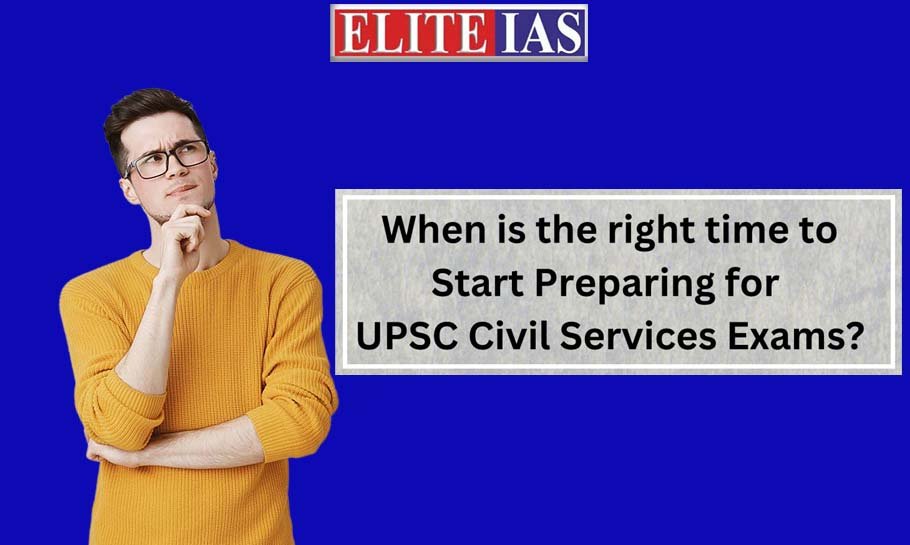
The Union Public Service Commission’s Civil Services Exam is one of the most difficult exams in the nation, but owing to the scope of its services, which include everything from administration and governance to policy creation and implementation, it is also the most sought-after government job. Among all the services included in the All-India Services, the Indian Administrative Services occupy a distinct stratum to the point where the UPSC CSE test is commonly referred to as the IAS exam.
Book Book Your Free Counselling Now
Thus, being an IAS is a goal that many people have had since they were young. However, other people only become interested in the services after they have graduated from college.
UPSC Pattern
The Indian Administrative Service (IAS), Indian Foreign Service (IFS), Indian Revenue Service (IRS), Indian Police Service (IPS), and more fascinating professions are accessible through the Civil Services exam. The competition is intense since there are normally just a few hundred places available for the elite services examination and lakhs of applicants. To outperform the competition, it’s critical to properly plan and increase your chances of success.
The Civil Services Test is divided into 3 stages: The Preliminary Exam (Prelims), which consists of multiple-choice questions with an objective nature, the Mains Exam (a written exam with an essay-like format), and a Personal Interview. There is a 1-2-month pause between each of the three stages.
When is the right time to start preparing for the CSE?
- Each year, tens of thousands of candidate’s study for the exam, some of them even leave rich employment to pursue their IAS dreams. Thus, the question of when to begin preparing for the CSE is evident.
- The post makes an attempt to provide an objective response to the subjective question in order to assist candidates in planning their UPSC CSE preparation path and in making wise and timely decisions.
- Keep in mind that, like all journeys, yours must be customised for you because it is both the same and different for each person.
How to Begin Your UPSC Preparation?
Start reading NCERT books for Political Science, History, Economics, and Geography from Class 6–Levels, based on the Civil Services Official Syllabus, to start your preparation for the Civil Services Exam. Additionally, you may utilise reference books. A few good ones for Prelims are:
| History | India’s Ancient Past by R. S. SharmaHistory of Medieval India by Satish ChandraHistory of Modern India by Bipin ChandraIndia’s Struggle for Independence by Bipin Chandra |
| Geography | Geography of India by Majid HusainOxford School Atlas |
| Economics | Indian Economy by Ramesh SinghPolitical ScienceIndian Polity by M. Lakshmikanth |
How to Prepare For UPSC Prelims?
- The UPSC Civil Services Preliminary Exam consists of two papers: Paper I, General Studies, is worth 200 marks and has 100 multiple-choice questions; Paper II, Aptitude, is worth 200 marks and has 80 multiple-choice questions.
- Current events, Indian history, Indian politics, Indian and global geography, Indian governance, economic and social development, general science, and general environmental ecology, biodiversity, and climate change topics are covered in Paper I’s syllabus.
- Earning high marks in the Prelims is crucial because it serves as a requirement to pass the Mains. In order to complete 100 questions in 120 minutes, an average of 40 seconds should be allotted to each one.
- The Prelims assess your conceptual clarity, memory capacity, and ability to recognise the right answer in addition to your knowledge of the facts.
- Spend time clarifying up your fundamental notions while carefully studying the course material.
- To increase your chances of passing the Prelims, concentrate on practise exams to enhance your accuracy and speed.
- Comprehension, logical thinking, fundamental numeracy, and decision-making & problem-solving are all included in the Paper II syllabus.
How To Prepare For UPSC Mains?
- Subjective responses are part of the Civil Services Mains exam, which gauges your knowledge, analytical prowess, writing prowess, and clarity of thinking.
- The Mains examination consists of a total of 9 papers, which are divided into 4 general studies papers, 1 essay paper, 2 language papers, and 2 optional subject papers. The 9 Papers are all of the subjective kind and last for 5 days.
- Study from NCERT textbooks as well as online resources like National Institute of Open Schooling study guides and IGNOU study guides to get ready for the Mains test.
- Read The Hindu, The Indian Express, and other renowned national publications in their whole and on a regular basis, as well as The Economist and India Today. Take note of the editorials’ writing style in particular.
- Daily writing practise is important, as is writing practise for the various papers. Ask a coach or tutor to review your responses so you can identify your areas of weakness and strengthen them.
How to Prepare For UPSC Personal Interview?
- Of the 2025 total points used to determine rankings, 275 points are awarded for the personal interview or personality exam.
- According to historical patterns, candidates who perform better in the personal interview tend to perform better overall on the Civil Services test.
- Maintain your awareness of current affairs, current sociopolitical events, and general knowledge even after passing the Mains test because the Personal Interview will cover these subjects.
- A candidate’s personality is evaluated throughout the interview in terms of mental acuity, analytical skill, approaches to difficult issues, integrity, and leadership skills.
- Practice conversational and public speaking skills to get ready for the in-person interview.
- To examine your confidence and body language, speak in front of a mirror.
- Participate in interview practise classes to gain confidence speaking during interviews and to receive feedback on how to do better.
- Be self-assured, presentable, and conversational on the day of the interview.
Age for UPSC Preparation
- Preparation at The Age of 18 Years – An Ideal Age
- IAS preparation should begin around age 18 to improve the likelihood of success on the first try.
- The optimal age to begin the IAS journey is 18. This is true since at this age, pupils have finished their high school coursework and entered colleges to pursue their degrees. Students doing IAS coursework in addition to their degree can select similar subjects for both programmes.
- This will be advantageous in both classes. The majority of students want to start their IAS test preparation around age 18.
- This is beneficial while choose optional courses for the IAS examinations. This will lower stress and improve time management.
- Preparation of IAS From The Age of 21 Years
- There are some students who wait until after their graduation before beginning their IAS test preparation.
- IAS aspirants can give their whole attention to studying for the UPSC examinations once they have graduated.
- In the list of IAS toppers, there are several examples of people who began studying at age 21 and are now all outstanding IAS officers.
- They are also qualified to take the test and organise their coursework in accordance with the most recent syllabus. The only need is that you devote yourself fully to it.
- Many students work a part-time job while studying for the IAS examinations. It is advised to just concentrate on tests unless having a part-time job would be necessary financially.
- At this age, there will also be a high degree of knowledge, maturity, and sincerity for the tests. The students have a specific goal in mind, and they are more committed to passing this test.
C. How should you prepare current affairs?
· The finest source for current affairs is a daily newspaper. Your daily routine should include reading the newspaper.
· Making notes from the news is not necessary right now. At first, you should merely take pleasure in reading the newspaper.
· Even at this point, you don’t need to be very picky about the articles you read; you may read the entire newspaper without worrying too much about what is important for the test and what isn’t.
Strategy to Start UPSC preparation
- Make specific notes focused on your areas of weakness and your preferred method of memory.
- Utilize all the tools at your disposal, including best UPSC coaching in Delhi facilities, online videos, guidebooks, and assistance from past instructors.
- Use your time carefully, focus on your studies, and keep testing yourself along the way. Be confident in your ability and make revision your closest friend.
- Get into the habit of reading newspapers carefully every day for at least two to three hours, and compare the news with the theories you’ve learned about political science, history, geography, and economics.
- Start preparing soon
- When one starts writing responses, taking practise exams, and outlining ideas for the vocal presentation of ideas and opinions on various topics, the genuine preparation process starts.
- You’ll have ample time and opportunity to develop these abilities if you get started early. Additionally, it will direct your thought process, and motivated by the desire to leave your stamp on society, you’ll start learning the appropriate and important knowledge.
- Those that begin early have a 50% chance of winning the war. Therefore, it is suggested to begin the preparatory process as soon as one decides to pursue a career in the public services.
- Additionally, UPSC evaluates every facet of your personality during the entire exam, thus this is essential.
- Since without it, no one can even be considered for the UPSC CSE preliminary exams, it puts your patience, commitment, and consistency to the test.
- Starting early will give you plenty of time and make your travel easier. The UPSC curriculum should be finished in nine to 10 months if one is fully committed to the test.
- Plan your journey
- Even if the candidate set aside two hours every day for the assignment, it would still take around six months.
- After finishing the NCERTs, aspirants should consult the UPSC syllabus and previous year’s questions. Their choice of optional for the UPSC Mains will also be narrowed down thanks to their fundamental comprehension.
- The aspirants must take up the standard texts and references for further in-depth study of the topic in the next phase.
- During the second year of preparation, this can be learned. Aspirants can begin preparing solutions to the Mains questions and undertaking sample texts in the third round while repeatedly reviewing the curriculum.
- Having proven that getting a head start on preparation provides you an advantage, it is critical to have a realistic vision and strategy. The ideal time to begin UPSC CSE preparation is when you are still enrolled in college or your undergraduate programme.
- Universities are a great location to practise speaking and writing. One can take part in a variety of events, including debates, writing for the campus journal, and NSS.
- Aspirants should take advantage of these possibilities since the experience they receive in college will help them build well-rounded personalities.
- By beginning with fundamental NCERTs during the first year and taking related courses, if offered, one can begin becoming familiar with the whole syllabus.
- This period can also be used to complete the optional and begin a serious study of the Mains subject that has been selected.
- The next step is obviously to apply for the exam, start studying full-time, and dedicate yourself to expanding your knowledge.
- You may then be catered to and mastered through newspapers, current events publications, and mock exams with study of the subjects you still find challenging.
When Should You Start UPSC Coaching?
Coaching may appear like the best technique to gain an advantage over the competition to hopefuls. But when and where should you start with all the coaching centres popping up all over the country and even online coaching for UPSC?
- Start off by making your own preparations; this will gauge your motivation and capacity for pursuing civil service education.
- Before you begin coaching, get in the habit of reading the newspaper every day and prepare at least the first round of notes.
- Try a few practise exams to acquire a sense of the Civil Services examination overall, and then sign up for tutoring.
- Coaching is typically seen to be more beneficial for the Mains test than the Prelims exam because the Mains requires more subjective types of replies. Prior to the prelims, if you are pressed for time, consider joining coaching to hasten the review process.
- Use a coaching centre to supplement your efforts, and do extensive research to identify the most appropriate coaching centre for your learning style.
Ideal Time to Start Preparing for the IAS Exam
· Many IAS test victories also occur in the second, third, and fourth attempts at ages ranging from 22 to 26 years old. So without a hesitation or concern, dedicate this time to studying for the IAS test.
· If you have graduated, you are typically between the ages of 21 and 23. The greatest time to sincerely study for the IAS exam is right now.
· Unfortunately, if you didn’t pass the civil services exam, there is still time to pursue a different job.
· However, if your family’s financial situation makes it difficult for them to support you or if they rely on your income, you can join the workforce. But you shouldn’t be discouraged by the fact that you cannot compete with IAS aspirants who are working full-time on their preparation.
· There are several instances of aspirants who passed the UPSC test and got employment. Yes, it will be a bit difficult for you to combine employment and school. However, you may join the list if you put in the necessary effort.
5. Be proactive
- For the UPSC Civil Services Exam in particular, learning doesn’t always occur through books and academic materials.
- Aspirants must be true citizens who are interested in understanding society and rising to the occasion when necessary given the unpredictable nature of UPSC questions and the kind of questions offered in both the Mains and Interview.
- It is one of the reasons you will discover (in various interviews by toppers) that many of the chosen candidates have their own distinctive stories of social or personal struggle, or that their commitment and motivation is driven by some social custom, condition, or vision to change and shape the society to its best.
- All of these call for solution-oriented thinking that is centred on optimism while also admitting negative, since a suitable solution is seldom found without a thorough investigation of the problem.
- If one has a solution-focused outlook, only time may stand in the way of their success.
How to Decide Your UPSC Optional Subject?
- Your performance in the Mains section of the Civil Services Exam will be reflected in the options you have for selecting a field from among the many Civil Services.
- Sociology, public administration, and anthropology are popular selections for the elective course. You can get better grades in both portions if you select an optional subject that is also covered in the Mains Examination General Papers.
- Choose a topic in which you feel confident and that is scoring well. Examine articles from past years to have a better understanding of what to expect.
- The two optional papers of the Civil Services Mains examination provide an astounding 27 options for extra subjects.
- Choose wisely since the subject you select will be relevant to both exams, each earning 250 points.
- The optional papers have an Honors level difficulty setting, which is higher than the pass course level for a bachelor’s degree but lower than the master’s.
Conclusion
Starting your earnest reading of standard literature to prepare for the UPSC Exam is only the beginning. IAS test candidates must continually enhance their personalities. One can begin preparing at any age by keeping up with current events in society, the nation, and the world and by learning about our history, culture, and governmental structure, among other things. And then, as stated in the article above, one should begin seriously preparing at the appropriate age to fulfil their goal of serving society and the country by working as a civil servant.
You Can Read Also:
How to Tackle Mental Health Issues Before and during UPSC Civil Services exam
Which NCERT Books Are Required For UPSC?
UPSC and Time Management: Can the Pomodoro Technique Help?



